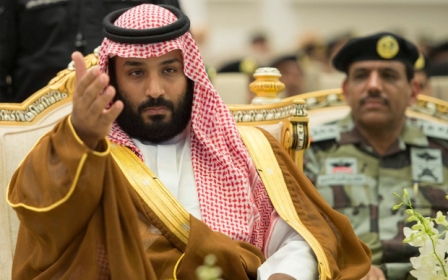Mystery surrounds fate of late King Fahd’s son amid Saudi crackdown

Amid speculation this week over the goings-on inside the five star hotel-turned-detention centre in Riyadh where Saudi princes, business moguls and hybrids of the two are being detained is the mysterious case of Abdul Aziz bin Fahd.
A swirl of reports, tweets and even a dedicated hashtag have fuelled rumours that the youngest son of the late King Fahd was killed in a shootout while resisting arrest on Saturday or later in custody.
In an apparent attempt to quell rumours, the Saudi information ministry spokesman released a statement on Wednesday saying there was “no truth” to the reports of the 44-year-old’s death. “Prince Abdulaziz is alive and well,” the statement said.
Still, like many of the reports coming out of Riyadh – including speculation that Lebanese Prime Minister Saad Hariri and Yemen President Abd Mansour Hadi are being held in the kingdom – it is impossible to confirm independently.
From future king to playboy
What is clear is that since his father’s death in 2005, the once-ascendant prince, who was raised to be a king, is now a minor figure in his family with little power – but a significant investment portfolio.
“He is the MBS that never made it,” said Madawi al-Rasheed, a visiting professor at the London School of Economics' Middle East Centre, referring to Crown Prince Mohammed bin Salman, Abdul Aziz's full cousin.
“He was groomed and spoiled and put in very senior positions when he was really like a teenager because [King] Fahd thought he could get away with this.”
Fahd’s strategy was typical of every other Saudi leader who has wanted to make his son king, Rasheed said. When the king, then in his eighties, appeared on TV or travelled, he would often take his young son along, even holding his hand.
But the problem was timing: even as young Abdul Aziz was groomed for his role, his uncles were still young and energetic and unwilling to let King Fahd’s son succeed his father.
After his father died, the prince, then in his thirties, was deprived of his government posts and largely marginalised, living the life of a playboy typical of the younger generation of Saudi royals for some time.
“He’s been politically irrelevant for quite some time now. He’s this rather tragic figure that just kind of had a lot of money,” said Henderson.
Interests in Oger, MBC
And it's this money that has likely made him a target, say analysts. In light of the kingdom's oil-dependency and financial difficulties, Mohammed bin Salman has said one of the motivations behind the latest sweep has been to overhaul the system. The Wall Street Journal has reported that the crown prince is potentially eyeing $800bn in seized assets.
He oscillated from being the Don Juan then to sort of becoming very pious
- Madawi al-Rasheed, visiting professor at LSE's Middle East Centre
The prince's business interests range from major holdings in Saudi Oger – the construction company owned by the Hariri family that built up large swathes of the kingdom until it ran into financial troubles – to the Middle East Broadcasting Centre (MBC), whose head, Alwaleed al-Ibrahim, is thought to be one of the detained figures held at the Ritz Carlton. Al-Ibrahim is Abdul Aziz’s uncle on his mother's side, Henderson said.
The prince also reportedly invested in the Heron Tower in London and has a billion-dollar property portfolio in the US. In July 2013, he put a mansion in London’s Billionaires Row on sale for $131m.
But in recent years, he appears to have had a spiritual awakening of sorts, said both Henderson and Rasheed.
“He oscillated from being the Don Juan then to sort of becoming very pious and citing Quranic verse and tweeting about them,” Rasheed said.
Earlier this year, Abdul Aziz’s tweets made headlines when he essentially defied his increasingly powerful cousin in public, defending Mohammed bin Nayef, the former crown prince removed from his post in June, and lashing out at the apparent partnership between Saudi Arabia and the UAE.
His last tweet appeared on 11 September.
Stay informed with MEE's newsletters
Sign up to get the latest alerts, insights and analysis, starting with Turkey Unpacked
Middle East Eye delivers independent and unrivalled coverage and analysis of the Middle East, North Africa and beyond. To learn more about republishing this content and the associated fees, please fill out this form. More about MEE can be found here.







